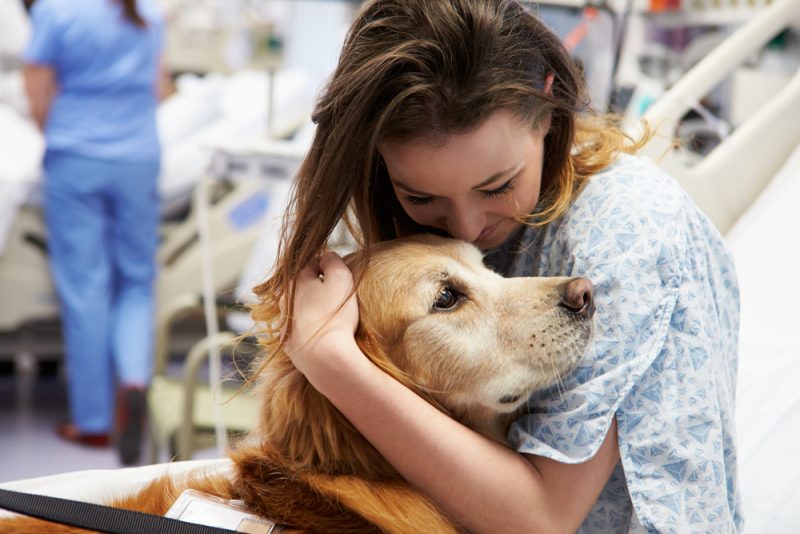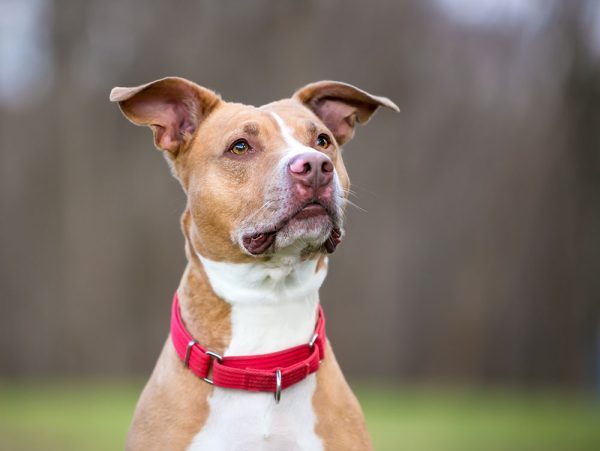Disclaimer: The purpose of this article is to provide general information only, it is not designed to replace veterinary advice tailored to your pet. Dog owners should consult a veterinarian if they have health concerns about their pet.
Whether you have a timid pup on your hands or your older dog suddenly shows signs of fear, it’s always cause for concern. The bad news is that there are quite a few culprits for fearful behavior in dogs, but the good news is that with time and patience, you can help your dog overcome it! The tricky part is identifying which stressors are affecting your dog. In this article, we’ll discuss some of the reasons that your dog might be unusually scared and what you can do to help remedy the situation.

The 2 Main Causes of Your Dog Being Scared of Everything
1. Stress
Stress or anxiety is an umbrella term for many behavioral disorders that can cause your dog to be fearful. Let’s talk about some of the reasons your dog might be experiencing anxiety, leading them to be scared of everything.
- Change: Drastic life changes that disrupt your normal routine, such as moving, adopting another pet, or bringing a new baby home can make your dog stressed and scared.
- Mirroring your stress: Your dog is great at reading your body language, and if you’re visibly stressed out, it can contribute to your dog becoming stressed, too. Not only that but dogs can scent stress on people.1
- Separation anxiety: Your dog loves being with you and some can become stressed out if you’re away from home for long periods. Some dogs are more fearful than others when you leave, but you can improve this situation with behavior training.
- Generalized anxiety: Some dogs have a personality that predisposes them to anxiety, for no particular reason. These dogs need training and, usually, medications to help them relax.
- Noise phobia: We all know how much some dogs hate fireworks and thunderstorms. Our houses can be pretty noisy too; whether it’s the sound of birds in a rural area or gardening tools in the suburbs. Some dogs are stressed by noises.
- Lack of early socialization: The most critical period for socialization is the 14-week “socialization window,” where you should expose your dog to as many sights, sounds, and places as possible.2 Anything dogs are not exposed to within this sensitive period will elicit a fear response later in life. This does need to be done in a considered manner as the opposite is also true. Things that are scary during this time, such as a dog attack can lead to lasting fears. The aim is for all new interactions to be positive.
Reducing anxiety is a complex process, and the ideal solution depends on what’s stressing your dog. Anxiety is a multifactorial condition and is correlated with a shortened lifespan.3 Helping them through the behavior is important and can involve three main areas of treatment.

1. Environmental Changes
There may be changes you can make to your dog’s environment to help them better cope with their situation. A simple example is playing music to drown out the noises that scare your dog or working from home to help your dog with separation anxiety. Of course, we can’t always rearrange our lives for the sake of our dogs but try to think about how you can reduce your dogs exposure to things that cause them stress or anxiety.
2. Behavioral Modification
Behavioral modification may be as simple as “habituation”, that is, the process of getting your dog used to something. Once they are desensitized to something, they no longer react fearfully. You will probably have to train your dog to exhibit desired behaviors. Timing and consistency are crucial in dog training. The timing has to be right so that you do not inadvertently reward bad behavior and you have to be consistent so they can learn to associate a certain behavior with rewards. Of course, all training should involve positive reinforcement and never punishment. We recommend working with a professional to make a training program for your anxious dog.
3. Medication
If you discuss your dog’s behavior with a veterinarian, they may recommend behavioral medications as part of the treatment for your dog. Medication will not cure your dog’s behavioral issues but it is a tool that can lessen their anxiety while they learn through behavioral modification techniques. A vet may prescribe a daily anxiety medication such as a Selective Serotonin Reuptake Inhibitor (SSRI) or a short acting tranquilizer for those stressful situations. Some effective over the counter options for anxious dogs are pheromone sprays and tryptophan supplements, however, these are usually not powerful enough to calm severely anxious dogs.
2. Medical Causes
There may be a medical reason for your dog’s sudden fearfulness.
- Pain: Dog’s that experience pain with interactions and handling can exhibit fearful behavior. Injuries, dental disease, ear infections, and arthritis are just some of the many reasons your dog may be in pain.
- Canine Cognitive Dysfunction: Fear is a feature of cognitive decline, similar to dementia, in senior dogs.
- Neurological conditions: Diseases that affect the brain can change your dog’s behavior, potentially making them more fearful.
- Vision or hearing loss: Dogs rely heavily on their senses, and it’s very frightening to them when their vision or hearing is impaired by conditions like cataracts or deafness, respectively.
If your beloved pooch is suddenly showing signs of fear or other signs make sure to book them in for a check with a veterinarian.
If you need to speak with a vet but can't get to one, head over to PangoVet. It's our online service where you can talk to a vet online and get the advice you need for your pet — all at an affordable price!


Wrapping Up
If your dog is scared of everything you should act to help them. If there is an obvious reason for anxiety such as a change in the household, making some environmental changes and habituation over time may be enough to get your dog back to normal. However, most dogs will need a training plan to help them. If you can’t identify the cause of anxiety, your dog spends their life in an anxious state due to generalized anxiety, or there is a lack of early socialization, there is a long road ahead of you, and you should seek professional help for maximum benefit. Additionally, if you think your dog has a medical condition a trip to the veterinarian is warranted. If in doubt, speak to your vet about the issue, they may be able to give some training tips or recommend treatments for your dog.
See Also: Why Is My Dog Hiding Under The Bed? Possible Reasons & How to Help (Vet-Reviewed)
Featured Image Credit: Paul’s Lady, Shutterstock



















